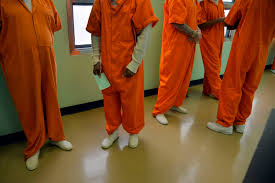Aman Singh Lail, from Loudoun County, is an inmate at Deerfield Correctional facility and we’ve asked for a pardon from the state so that he may avoid the deathly virus infecting our prisons and jail.
 Aman is one of many in our prisons and jails at risk because the coronavirus has made these facilities unsafe.
Aman is one of many in our prisons and jails at risk because the coronavirus has made these facilities unsafe.
I’ve asked the State to release Aman from prison since they can’t protect him from the disease.
At our local jail, and jails across the Commonwealth, authorities are releasing some inmates who are serving time while leaving in custody those who are only accused of committing a crime.
We might consider the fact that very few crimes either charged or resulting in conviction provide for severe illness or death as an appropriate punishment.
There is this “quaint notion” that one is innocent until proven guilty but more often than not, bail is used as a way not to assure an appearance, or protect anyone, but to break the accused, to demean him, to compromise his ability to consult with counsel, or to prepare his case.
How can anyone justify exposing any inmate, or person merely accused, to this virus no matter the sentence rendered nor the crime charged?
The Governor is releasing some inmates based on the fact that they have less than a year in custody.
What about those inmates who have more time than a year and who have heart and lung disabilities like Aman who has high blood pressure and asthma?
What about those accused of crimes, and not convicted, who are vulnerable in one way or another like my client in the local jail.
Aman says that the “tension” where he’s lodged at Deerfield “is at an all-time high. Contractors come into the facility daily. Inmates are being forced to work at other facilities that currently have cases of Covid-19 and then they return here. Officers sick and coughing are still coming to work and some may even be asymptomatic and knowingly spreading COVID-19.”
The disease has been found in our local jail as well.
Both clients have righteous causes to be released to home with GPS ankle monitors. So do many others.
We are on notice that more infections and deaths will follow from what we’ve observed in other prisons and jails across the nation. The feds have an infection rate of about 7% of the confined population. In Michigan, the infection rate remains about 8%. Philadelphia ig going to release up to 1,800 state prisoners because of infections and deaths. There is hardly a jurisdiction that hasn’t released inmates because the prisons and jails can’t protect the inmates from the virus.
The statewide strategy for prisons and jails in Virginia is to release some, to limit somewhat those who may get sick or die, but, at the same time, accept the fact that others not released will get sick and some will die.
Our prisons and jails don’t have the tests they need, nor the PPE (Personal protective equipment), nor the masks, nor the gloves, ventilators, medical staff, nor the hospitals to take care of these inmates.
We’ve seen what happens in nursing homes, retirement communities, cruise ships, even on a military ship; it’s happening in our prisons and jails.
We have had lulling assurances since January from persons who knew better when they made false assurances, giving the virus license to grow; all the belated efforts and apologies come too late for those who become infected, deathly ill and die.
The standard of civilization is how we treat our own. Prisons and jails have not done well in the histories and studies that have proliferated over the centuries. And I’m not saying there haven’t been efforts to rebut the worst practices. But they’ve hardly been effective. Nathaniel Hawthorne once described prison as “the black flower of civilized society.” His metaphor begs the question out of what soil does such a flower emerge. For our purposes that soil might be called “deliberate indifference” to the safety of inmates and staff.
The U.S. Supreme Court in a case titled, Estelle v. Gamble, 429 U.S. 97 (1976), held that to ignore a prisoner’s serious medical needs can amount to cruel and unusual punishment, because “[a]n inmate must rely on prison authorities to treat his medical needs; if the authorities fail to do so, those needs will not be met.”
The Estelle court concluded that “deliberate indifference to serious medical needs of prisoners constitutes the ‘unnecessary and wanton infliction of pain.’”
These punishments, not rendered by a court, nor properly tolerated by one, are incompatible with “the evolving standards of decency that mark the progress of a maturing society.” Trop v. Dulles, 356 US 86, 100-101 (1958).
